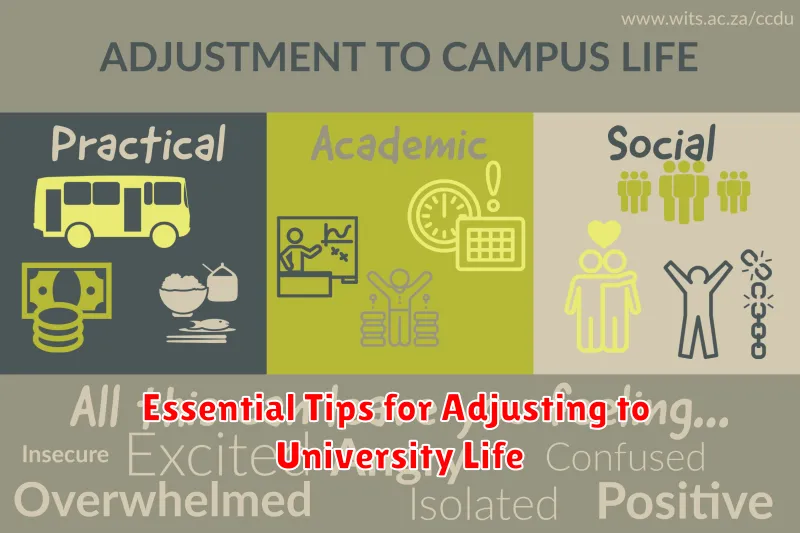Embarking on your university journey is a significant transition, marked by both excitement and challenges. Successfully adjusting to university life requires careful planning and a proactive approach. This article provides essential tips designed to help you navigate the complexities of academic life, social integration, and personal well-being during this transformative period. From managing your time effectively to building a strong support network, these guidelines will empower you to thrive in the dynamic university environment and maximize your potential for both academic and personal growth.
Adjusting to the demands of university life can be overwhelming, especially for first-year students. The transition from high school to higher education involves adapting to increased academic rigor, navigating a new social landscape, and developing essential life skills. This article offers practical advice and essential tips for overcoming common challenges encountered by university students. Learn how to establish effective study habits, manage your finances responsibly, maintain a healthy work-life balance, and cultivate meaningful relationships to ensure a successful and fulfilling university experience.
Get Familiar with Your Campus
Knowing your way around campus can significantly ease anxiety and save valuable time. Orientation programs are excellent resources. Take advantage of campus tours and information sessions to familiarize yourself with key locations.
Identify essential buildings like your classrooms, the library, student services, and the health center. Locate computer labs, printing facilities, and study areas. Understanding the campus layout will make your daily routine much smoother.
Transportation is another crucial aspect. Learn the campus bus routes, if available, or find safe and efficient walking paths. Knowing how to get around quickly and safely will contribute significantly to a positive university experience.
Develop Good Study Habits Early
Transitioning to university demands a shift in study habits. The sooner you adapt, the smoother your academic journey will be. Time management is crucial. Create a realistic study schedule and stick to it. This involves allocating specific time slots for each subject, incorporating breaks, and prioritizing tasks.
Active recall is a powerful learning technique. Instead of passively rereading notes, test yourself frequently. Use flashcards, summarize concepts from memory, or teach the material to someone else. This reinforces understanding and improves retention.
Find a study environment that suits your learning style. This could be a quiet library, a bustling coffee shop, or a dedicated space in your dorm. Minimize distractions and create a conducive atmosphere for focused learning.
Join Clubs and Organizations
University life extends far beyond the classroom. Joining clubs and organizations is a crucial step in adjusting to this new environment. These groups provide opportunities to meet new people, explore your interests, and develop valuable skills.
Whether you’re passionate about debating, coding, or hiking, there’s likely a club or organization for you. Take advantage of university resources like student activity fairs and online directories to find groups that align with your interests.
Participating in extracurricular activities not only enriches your university experience but also strengthens your resume and helps you build connections for future career endeavors. Don’t hesitate to explore different options and find your niche within the campus community.
Balance Academics and Social Life

Striking a balance between academics and your social life is crucial for a fulfilling university experience. Prioritize your academic responsibilities by creating a realistic study schedule. Allocate specific times for classes, studying, and assignments.
Engage in social activities that interest you. Join clubs, attend events, and connect with classmates. However, avoid overcommitting. Learn to say no to social events if they conflict with your academic priorities.
Time management is key. Utilize planners, calendars, or apps to stay organized. Breaking down large tasks into smaller, manageable chunks can make them less daunting. Remember to schedule in downtime for relaxation and self-care.
Create a Budget and Stick to It
Managing your finances is crucial for a successful university experience. Creating a budget helps you track your spending and avoid financial stress.
Begin by listing all your income sources (scholarships, part-time jobs, family contributions). Then, list all your essential expenses: tuition, rent, utilities, groceries, and books. Factor in non-essential expenses such as entertainment and social activities.
Use budgeting apps, spreadsheets, or even a notebook to monitor your spending and ensure it aligns with your budget. Regularly review and adjust your budget as needed. Sticking to a budget allows you to prioritize your spending and make informed financial decisions.
Stay Organized with a Planner
University life presents a whirlwind of classes, assignments, extracurriculars, and social events. A planner is your key to managing it all effectively. Whether you prefer digital or paper, a planner provides a centralized location to track deadlines, appointments, and commitments.
Schedule everything. From classes and study sessions to club meetings and doctor’s appointments, inputting everything into your planner helps visualize your time commitments and avoid conflicts. Prioritize tasks. Use your planner to identify crucial deadlines and allocate sufficient study time. This proactive approach reduces stress and promotes academic success.
Review your planner regularly. A quick daily review keeps you aware of upcoming deadlines and allows for adjustments as needed. This consistent check-in is essential for maintaining organization and staying on track.
Make Use of Campus Resources
University life can be challenging, but campuses offer a wealth of resources to support students. Take advantage of these services to enhance your academic and personal well-being.
Academic support includes tutoring centers, writing labs, and academic advising. These resources can help you succeed in your courses and develop essential academic skills. Don’t hesitate to reach out for assistance.
For personal well-being, consider utilizing counseling services, health centers, and recreational facilities. These resources can help you manage stress, maintain your physical health, and connect with the campus community.
Explore your campus website or student handbook to discover the full range of available resources. Familiarize yourself with these services early on to ensure a smooth transition to university life.
Establish Healthy Routines
Transitioning to university life often disrupts established routines. Creating a structured schedule is essential for academic success and overall well-being.
Prioritize creating a consistent sleep schedule. Adequate sleep improves focus and cognitive function, crucial for managing a demanding workload.
Establish regular study times. Designate specific blocks of time for studying and stick to them as much as possible. This promotes discipline and helps prevent procrastination.
Incorporate healthy habits like regular exercise and a balanced diet. These habits contribute to physical and mental well-being, making it easier to handle the stresses of university life.
Connect with Professors and Advisors
Building relationships with your professors and academic advisors is crucial for a successful university experience. Professors offer valuable insights into your field of study and can provide essential guidance on academic matters. Don’t hesitate to attend office hours with questions about course material or for advice on future career paths.
Your academic advisor is your primary resource for navigating university requirements and planning your coursework. They can help you choose appropriate classes, understand degree requirements, and connect you with relevant resources on campus.
Proactive communication is key. Introduce yourself early in the semester and maintain regular contact. This demonstrates your commitment to learning and allows them to understand your academic goals.
Manage Stress and Seek Support

University life presents a unique set of challenges. Managing stress is crucial for academic success and overall well-being. Develop healthy coping mechanisms such as regular exercise, mindfulness practices, or engaging in hobbies.
Don’t hesitate to seek support when needed. Universities offer various resources, including counseling services, academic advisors, and student support groups. These resources can provide valuable guidance and assistance in navigating the challenges of university life.

